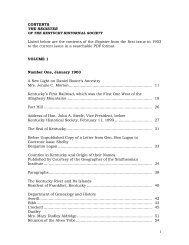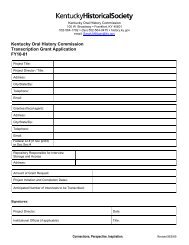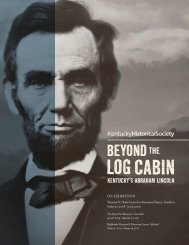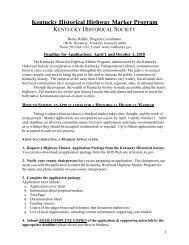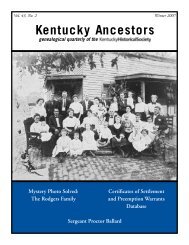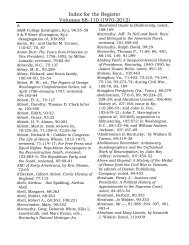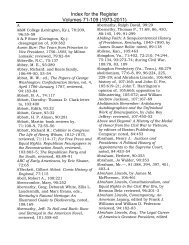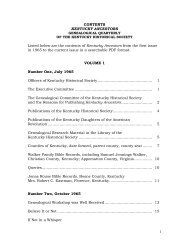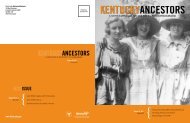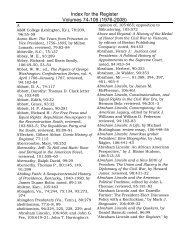Kentucky Ancestors, Volume 46, Number 2 - Kentucky Historical ...
Kentucky Ancestors, Volume 46, Number 2 - Kentucky Historical ...
Kentucky Ancestors, Volume 46, Number 2 - Kentucky Historical ...
You also want an ePaper? Increase the reach of your titles
YUMPU automatically turns print PDFs into web optimized ePapers that Google loves.
of the taxes assessed; but that the said<br />
Virginia and Lizzie, so soon as they were<br />
advised of the facts, paid to the sheriff<br />
the full amount of the taxes as originally<br />
assessed, therefore, Be it enacted by the<br />
General Assembly of the Commonwealth<br />
of <strong>Kentucky</strong>, That Virginia and Lizzie<br />
Smith be, and they are hereby, released<br />
from the payment of all damages incurred<br />
by reason of the non-payment of taxes for<br />
the years 1869, 1870, and 1871; and that<br />
the payment of the taxes assessed be an<br />
acquittance and discharge of all liability<br />
in that behalf. This Act shall take effect<br />
from its passage. 37<br />
1873 (19 March)<br />
This act amended an act entitled “An Act to tax<br />
railroads, turnpike roads, and other corporations in<br />
aid of the Sinking Fund” approved 20 February 1864.<br />
Under the new legislation, narrow gauge railroads<br />
(railroads of a gauge of three feet and under) were<br />
ordered to be assessed at the rate of $10,000.00<br />
per mile. The act was in effect from the date of its<br />
passage. 38<br />
1873 (21 April)<br />
Whereas, Jason Fields was<br />
sheriff of Carter County during the<br />
years 1860, 1861, 1862, and 1863,<br />
and while sheriff of said county he left<br />
the same and joined the Confederate<br />
army; took the tax books with him<br />
for said years; died, and said tax books<br />
were lost. And many persons in said<br />
county paid their taxes for said years,<br />
but lost their receipts therefore during<br />
and since the war, and are again<br />
required to pay said taxes; for remedy<br />
whereof, Be it enacted by the General<br />
Assembly of the Commonwealth of<br />
<strong>Kentucky</strong>: That whenever any person<br />
claiming to have paid their taxes in<br />
said county of Carter for either of the<br />
years 1860, 1861, 1862, and 1863,<br />
and such persons can prove said<br />
payments, they may do so; and such<br />
proof, by affidavits or depositions,<br />
when satisfactory, shall exonerate said<br />
84 | <strong>Kentucky</strong> <strong>Ancestors</strong><br />
persons from again paying said taxes<br />
for said years. And the sheriff or<br />
party with whom said taxes are listed<br />
for collection shall take said proof,<br />
and give such parties receipts against<br />
said taxes, when proven to have been<br />
paid; and to the extent thus proven,<br />
the sheriff or tax collector shall have<br />
credit in his settlement with the<br />
proper court or person. This Act shall<br />
take effect from its passage. 39<br />
Note: This legislation became law without the<br />
governor’s signature or veto.<br />
1874 (23 February)<br />
The “Revenue and Taxation” chapter of the<br />
<strong>Kentucky</strong> Revised Statutes, renamed Chapter 92,<br />
was amended to declare each voting precinct in the<br />
counties, cities, and towns of <strong>Kentucky</strong> constituted<br />
a revenue district for the purpose of assessing taxes.<br />
“For the more convenient and efficient assessment of<br />
taxes, it shall be the duty of the Governor, Auditor,<br />
and Attorney General to prescribe a form of blanks<br />
for assessment to be furnished by the tax assessor<br />
to each taxpayer, which blanks shall have proper<br />
headings so as to enable the taxpayer to furnish a<br />
complete list or schedule of all his taxable estate, real,<br />
personal, and mixed with a fair description of his<br />
lands and town lots, and the value of all his taxable<br />
property; upon which blanks shall be printed the<br />
questions the tax assessor shall ask each taxpayer;<br />
and upon which blanks shall also be printed the<br />
oath that is required to be taken by each taxpayer.”<br />
The assessor then entered the information in the<br />
assessment book filed with the county court clerk. 40<br />
1876 (7 March)<br />
The legislature fixed the tax rate on real and<br />
personal estate at forty cents per each one hundred<br />
dollars of value. Of that amount fifteen cents was<br />
designated for the ordinary expenses of government,<br />
five cents for the use of the sinking fund, and twenty<br />
cents for the support of common schools. All laws<br />
in conflict with this act were repealed. The act was<br />
in effect from its passage. 41 Note: By 1878 the<br />
tax rate had increased to forty-five cents per each<br />
one hundred dollars of the real and personal estate<br />
directed to be assessed for taxation, due and payable





